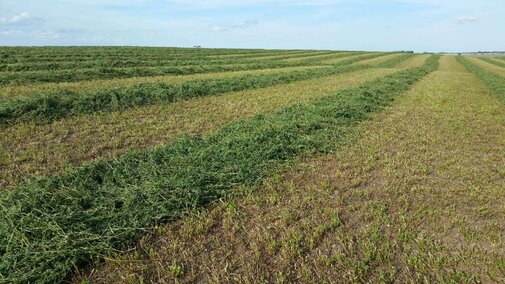Mid-Season Forage Check
As we move through midsummer, it’s time to evaluate our forage situation. Depending on your location, meadow hay harvest might be starting, you could be on your second cutting of alfalfa, or preparing to cut warm-season annual crops soon.
Now is a great time to assess your forage inventory. Most perennial grasses have completed their growth, and multiple alfalfa cuttings should be done. Even if not all meadow hay and summer annuals are harvested, we can estimate our total yield for the year.
Ask yourself: Does our current yield meet our winter feed needs? If not, consider options like late planting of summer annuals or fall forages like oats for grazing. Be cautious with planning fall hay harvests however, due to drying challenges.
If you have excess hay, plan on how to manage it. For selling or storing, prevent quality loss by keeping hay dry. Store it under a roof or tarp if possible, elevate it from the ground, line bales with the topography and sun, and ensure good airflow around bales to maintain quality.
Finally, if you haven’t done so, send in hay samples for quality testing. Hay quality varies year-to-year, even from the same field. Testing helps us match hay to livestock needs or set appropriate selling prices.
Assessing forage stores now, while plants are still growing and hay is being harvested, helps close forage gaps, manage surplus, and ensure quality use later.
Rained-On Hay
Rained-on hay can still be a valuable resource, even if rain fell on cut hay windrows has lowered both yield and quality during the drying process. However, losses will vary and will likely be less if the rain occurred soon after cutting and the forage was not re-wetted many times.
Wisconsin research indicates that 1 inch of rain on alfalfa after one day of drying caused 22% dry matter loss, compared to 6% yield loss without rain damage. However, yield losses doubled to 44% with 1.6 inches of rainfall on alfalfa over a few days. Grass hays pegged less dry matter losses.
University of Minnesota research indicates that rainfall wetting of dried alfalfa has little impact on protein content unless high leaf droppage losses occur. However, rained-on hay carbohydrates declined 6% to 40%, thus lowering overall forage energy content.
Rained-on hay has increased risk of forage mold and heat damage during storage. Further, windrows remaining in fields for longer periods can injury regrowth and reduce yield of future cuttings. So the best option for wet windrows is to remove the cut hay as quickly as possible. Consider turning wet windrows and baling, chopping the forage, or using severely damaged forage as mulch.
To know the true quality of rained-on hay, submit a forage sample to a lab for testing. Remember that a hay test is truly the best way to know the quality of forage.
Finally, monitor rained-on windrows for insects and weeds invasion, and treat to prevent further problems.
More alfalfa and forage hay management guidelines are available on CropWatch or UNL Beef.
Nebraska Grazing Conference 2025
Make plans now to attend the 2025 Nebraska Grazing Conference in Kearney at the Younes Conference Center on Aug. 5. This year, the conference will be a single day.
A field tour kicks off the conference from 9-11:30 a.m. Tuesday, Aug. 5. Grazing management and conservation will be the focus of this field activity. There is no fee to attend the field tour.
The formal part of the conference will begin Tuesday afternoon with recognition of the Worth Ranch, who was the 2024 Nebraska Leopold Conservation Award winner. The keynote speaker for the program will be Dallas Mount with the Ranching for Profit group. He will present a session titled “Raising the Bar — Becoming a Savvy Farm and Ranch Business Leader," highlighting key tools for improving your economic and financial decision-making.
There will also be two producer panels continuing the discussions on farm and ranch business management.
Following a banquet in the evening, Dallas Mount will host an informal question and answer session.
For more information and to register for the field tour and conference, visit the Nebraska Grazing Conference site. There is no registration fee for high school or college students.

